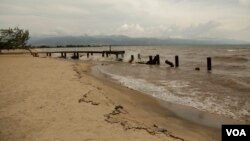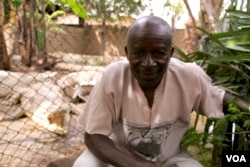In Burundi, people who swam a lot in the vast Lake Tanganyika used to be nicknamed crocodile, as there were so many pairs of floating eyes and scaly tails circling the waters. But after a civil war and continued hunger in sub-Saharan Africa's most food insecure country, the crocodiles are not to be seen, apart from in the home of one dedicated croc monsieur in the capital, Bujumbura, who took in a handful of babies and is about to be stuck with 40 more.
The crocodiles have all but disappeared from the shores of Burundi's Lake Tanganyika - the longest freshwater lake in the world.
Waiters at an upmarket lakeside restaurant say the only crocodiles they see are the ones embroidered on the napkins, and they suspect the real ones have swum to Zambia to take refuge from poachers who have plundered the lake for meat in sub-Saharan Africa's hungriest country.
But just minutes away, eight of them are sunning themselves on the front porch of former charity worker Albert Ngendera.
Ngendera says most crocodiles were eaten during a 12-year civil war in Burundi, and so when he saw poachers bringing these babies from the lake 12 years ago, he snapped them up.
“Before, I had dogs, about 10 of them, but dogs have no benefit," he said. "They're their for security but nothing else. These animals, they're nice to look at”
Now, Ngendera likens his collection of 40 pigeons, seven crocodiles, eight tortoises, two snakes, one monkey and a chimpanzee as a type of ark for Burundi's endangered animals. He has bought most of them from hunters who now know he will buy animals to save them from cooking pots.
Even though Ngendera has eaten crocodile in the past, he would never dream of it now, and treats his pets as well as he does his six children.
“I'd do everything I can so that they can eat. They're like my children, and I will always love them like that," he said. "My children know this, because I tell them that if the animals don't eat, you won't either”
He has names for some of them, like Maria and Andre, and wants to open a park for them on government land he has been promised.
Ngendera's croc stock is about to rise sharply, with the first of up to 45 babies expected in January.
Even though he loves his pets, if he realizes his grand plan of breeding between five to 10,000 crocodiles over the next 20 to 50 years, he will literally reduce them to bits to make handbags and belts.
Nearer the city center, Burundi's “living museum” houses seven crocodiles in small pens. The zoo has few visitors able to afford the $4 guinea pigs and $10 rabbits to feed the crocs that have lived alone for almost 20 years, because there's no space for babies.
Manager Jean-Marie Ntahamvukiya says he, too, is waiting for the government to grant him more land to give the zoo's star-crossed crocs Romeo and Juliet a chance to be together.
“It's a bit sad. We should at least find a bit space to put them in so that they can reproduce," he said. "As there aren't many in the lake, there are some people keeping them at home. In the lake, because there aren't that many and they aren't protected, they're now endangered. But if the government studied how they could keep them better or let people know how to keep them, they could be safe.”
But Director General of the Ministry of Environment Ferruzi Mohamed says a law imposing six-month jail terms and fines for poaching will protect the crocodiles in the lake, and he is against the animals being kept in captivity.
“We're not going to build a zoo or enclosures for these animals, often it's thanks to a lack of funds but even if we did have them, we wouldn't enclose this species away from their natural habitat,” he said.
But if notoriously corrupt Burundi wants to save its crocodiles, it had better act soon.






